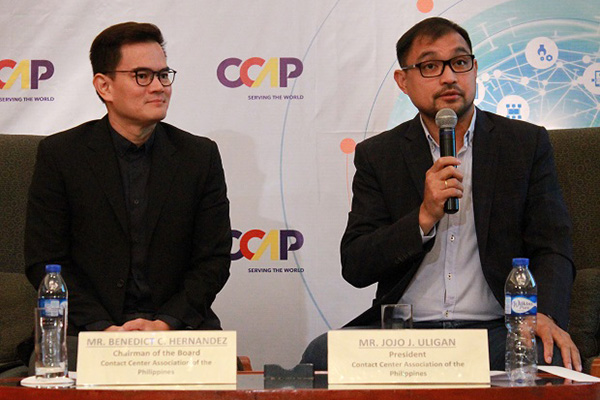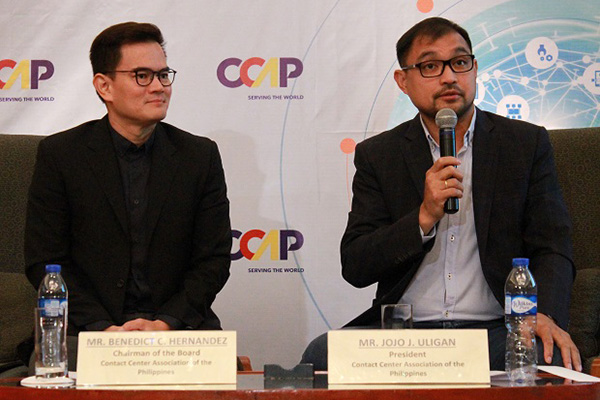Call center group not ruffled by emergence of AI, robotics

Date:
September 8, 2017
The Contact Center Association of the Philippines (CCAP) on Wednesday, Aug. 30, expressed bullishness that the country’s BPO industry will continue to grown and is capable to handle the challenges of the entry of robotics, artificial intelligence (AI), and other related technologies in the market.

CCAP chair Benedict Hernandez (left) and CCAP president Jojo Uligan
“You can view the emergence of digital technologies as either a threat, particularly on job creation, or an opportunity. Our industry certainly sees the upside opportunities in investing in digital technologies to drive enhanced experiences of our clients and customers. In fact, digital capabilities in analytics, robotics, and AI have opened new opportunities for us to impact customer experience or CX,” said CCAP chairman Benedict Hernandez in a press briefing held in Makati City.
For the call center sector alone, Hernandez said CCAP projects that 435,000 jobs will be generated from 2016 to the 2022 period. He added that an average of 73,000 jobs — or 6 percent of growth per year — will still be generated after the introduction of automation technologies.
He said CCAP is also building partnerships with schools to develop specific skills for the senior high school students.
“Our clients have started to look to us to help them re-imagine and enable their customer experience (CX) strategy in the age of digital. These are exciting times for our industry,” Hernandez added.
Jojo Uligan, president of the CCCAP, stressed there is a big need for Filipino workers to acquire new skill sets such as technology proficiency, deep industry or domain expertise, problem-solving and analytical skills.
“The nature of work will continue to change, the same way it has changed over generations,” he said. “Rules-based, transactional type of work will be the first to be automated, this is already happening today.”
To be relevant in the digital economy, Uligan said Filipinos need to sharpen their analytical skills so they can tackle complex, judgment-based and more exciting tasks.
“I don’t think we should focus the debate on whether jobs will be lost with the emergence of these technologies. Jobs are being transformed and our focus now is the investment needed in upskilling our people,” Uligan explained.
Uligan also revealed that the industry will continue to work closely with government and the academe towards forming an investor-friendly environment and developing the right curricula and programs for the students respectively.
“We predict about 8% annual growth until 2022, that takes our revenues from $12.8 billion last year to $20.4 billion in 2022,” Uligan said.
Source: https://goo.gl/dnzFMY














